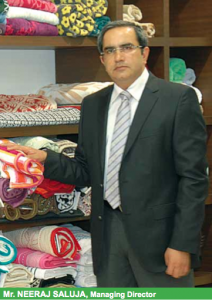 The Ludhiana-based integrated textile conglomerate, SEL Manufacturing Company Ltd., has achieved a turnover of Rs. 1,071.67 crores for the half-year ended September 30, 2011, against Rs. 812.79 crores in the corresponding period last year, an increase of 31.85 per cent. Earnings before depreciation, interest and tax increased from Rs. 137.18 crores in the first half of 2010-11 to Rs. 182.45 crores during the half-year ended September 30, 2011, recording an increase of 33 per cent. Profit after tax during the half-year ended September 30 stood at Rs. 39.06 crores (Rs. 52.79 crores).
The Ludhiana-based integrated textile conglomerate, SEL Manufacturing Company Ltd., has achieved a turnover of Rs. 1,071.67 crores for the half-year ended September 30, 2011, against Rs. 812.79 crores in the corresponding period last year, an increase of 31.85 per cent. Earnings before depreciation, interest and tax increased from Rs. 137.18 crores in the first half of 2010-11 to Rs. 182.45 crores during the half-year ended September 30, 2011, recording an increase of 33 per cent. Profit after tax during the half-year ended September 30 stood at Rs. 39.06 crores (Rs. 52.79 crores).
While increase in EBIDTA is attributable to operational efficiencies, the company is going through a lot of expansion and the full contribution thereof is yet to be captured in its financial results.
The Indian economy has been witnessing increasing interest rates. Yarn prices had an uncertain and declining trend. Further, the uncertainty in the Government policies with regard to cotton and cotton yarn exports have also added to the woes of the textile sector.
The early part of the current fiscal was marked by a high volatility in cotton prices. The trend of spiralling raw material prices was reversed, followed by a steep fall in the prices of cotton by the end of the last season. Still cotton prices were very high as compared to the previous years. Indian textile companies, which were carrying stocks of cotton of high cost had to face a very tough situation as yarn prices had fallen steeply and demand was sluggish. This unprecedented phenomenon in cotton prices, high inventory carrying costs followed by devaluation of stocks has been quite challenging for the textile sector and has been greatly responsible for erosion in profitability.
SEL Manufacturing, however, continues moving forward on the expansion front. The company is implementing another integrated textile project for setting up a spinning unit with a capacity of about two lakh spindles, 40 million metres in denim fabric and 8 million pieces in denim garments per annum. The project is coming up in Muktsar district of Punjab.
Earlier, during the current fiscal, the company had partly made operational its spinning unit in Sehore district of Madhya Pradesh. Its implementation is in full swing.
Out of the total capacity of 4,00,000 spindles, 50,000 spindles are already operational. By January, 2012, a total of one lakh spindles will be operational. The products manufactured in this unit have already started catering to the Indian as well as overseas markets. The company is hopeful that the full capacity will be attained within one year. It is also increasing the capacity of its spinning units at Neemrana in Rajasthan and at Hansi in Haryana by addition of about 60,000 spindles, which would be operational by February-March 2012.
SEL is also increasing its annual capacity in terry towels and knitted garments from 45 TPD to 100 TPD and from 20 million to 50 million pieces respectively. With this expansion and capacity augmentation, SEL offers a promising future for its stakeholders.
The company is emerging a leading textile manufacturer over the last few years. From the setting up of its first spinning unit in 2005 and its first loom in 2008, the company is building up its capacities with ultra-modern technologies. The plant and machinery deployed by the group is relatively young.
On the CSR front, SEL’s model outlines various development activities in education, sports, environment and medical facilities. SEL’s CSR efforts echo values for a progressive state, promoting and practicing action beyond mere statutory compliance.
With adequate utilization of the available technology and human capital and driven by a systems and forward-looking approach, the group is carving out a niche for itself not only in the Indian textile sector but also on the global map.
